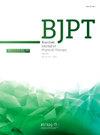巴西葡萄牙语版医学生循证实践能力评估问卷:翻译、跨文化适应和测量特性
IF 3.2
3区 医学
Q1 ORTHOPEDICS
引用次数: 0
摘要
目的 将学生循证实践问卷(S-EBPQ)和循证实践评估能力问卷(EBP-COQ)翻译成巴西葡萄牙语;对巴西葡萄牙语版本进行调整和验证,以便用于来自不同课程的医护学生;评估翻译版本和调整版本的测量特性:测试了三个版本:S-EBPQ-BR、针对护理专业学生的 EBP-COQ-BR 和针对医护专业学生的 EBP-COQ-BR。我们评估了内部一致性、信度、建构效度、响应度和天花板/地板效应。在可靠性方面,受试者两次填写问卷,每次间隔一周。结果 没有发现理解或适用性方面的问题。就总分而言,翻译后的问卷显示出较强的内部一致性(Cronbach's alpha=0.87-0.92)、良好至中等的可靠性(ICC3,1=0.63-0.88)、与循证实践问卷有中等至非常强的相关性(r=0.43-0.89)的结构效度、无上限或下限效应,以及教育项目前后得分差异显著的充分响应性。就分量表而言,除了 S-EBPQ-BR 态度(内部一致性低、可靠性差和天花板效应)、EBP-COQ 态度(建构效度不足)和 EBP-COQ 技能(建构效度不足)外,大多数分量表都表现出令人满意的测量特性。然而,某些子量表的内部一致性、可靠性和建构效度不够理想。本文章由计算机程序翻译,如有差异,请以英文原文为准。
Brazilian Portuguese version of questionnaires assessing evidence-based practice competencies in healthcare students: Translation, cross-cultural adaptation, and measurement properties
Background
While several instruments assess evidence-based practice (EBP) competencies, few are available for the Brazilian population, particularly healthcare students.
Objective
To perform a cross-cultural translation of the Student Evidence-Based Practice Questionnaire (S-EBPQ) and Evidence-Based Practice Evaluation Competence Questionnaire (EBP-COQ) into Brazilian Portuguese; to adapt and validate the Brazilian Portuguese versions for use with healthcare students from diverse courses; and to assess the measurement properties of the translated and adapted versions.
Methods
Four hundred forty-two healthcare students were included, and three versions were tested: S-EBPQ-BR, EBP-COQ-BR for nursing students, and EBP-COQ-BR for healthcare students. We assessed internal consistency, reliability, construct validity, responsiveness, and ceiling/floor effects. For reliability, participants completed the questionnaires twice, one week apart. For responsiveness, they completed them after participating in an educational program.
Results
No issues were identified with understanding or applicability. For overall scores, the translated questionnaires demonstrated strong internal consistency (Cronbach's alpha=0.87-0.92), good to moderate reliability (ICC3,1=0.63-0.88), construct validity with moderate to very strong correlations to the Evidence-Based Practice Questionnaire (r=0.43-0.89), no ceiling or floor effects, and adequate responsiveness with significant pre- and post-educational program score differences. For subscales, the majority of them demonstrated satisfactory measurement properties, except for S-EBPQ-BR attitude (low internal consistency, poor reliability, and ceiling effect), EBP-COQ attitude (inadequate construct validity), and EBP-COQ skills (inadequate construct validity).
Conclusion
The Brazilian Portuguese versions of S-EBPQ and EBP-COQ exhibit strong measurement properties, including high internal consistency, adequate reliability, valid construct validity, and responsiveness. However, some subscales present suboptimal internal consistency, reliability, and construct validity.
求助全文
通过发布文献求助,成功后即可免费获取论文全文。
去求助
来源期刊
CiteScore
6.10
自引率
8.80%
发文量
53
审稿时长
74 days
期刊介绍:
The Brazilian Journal of Physical Therapy (BJPT) is the official publication of the Brazilian Society of Physical Therapy Research and Graduate Studies (ABRAPG-Ft). It publishes original research articles on topics related to the areas of physical therapy and rehabilitation sciences, including clinical, basic or applied studies on the assessment, prevention, and treatment of movement disorders.

 求助内容:
求助内容: 应助结果提醒方式:
应助结果提醒方式:


